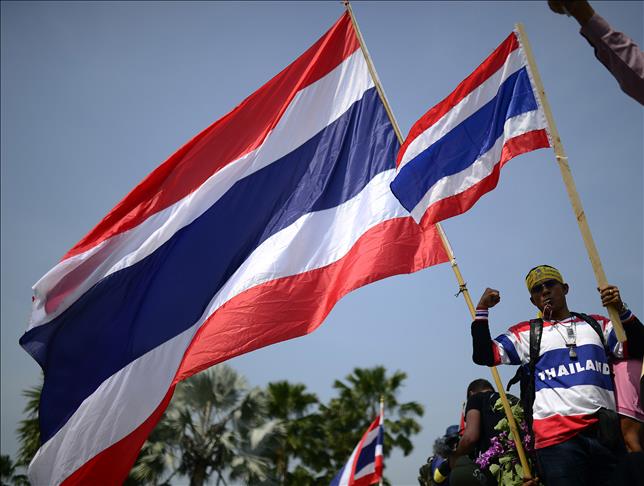July vote gives hope of end to Thai political crisis
Thailand's government and election commission agree to hold elections July 20; opposition leader promoting 'peace proposal' to end political deadlock

BANGKOK
For the first time in six months, the skies over Bangkok are clearing - a date finally set Wednesday to rerun Thailand's aborted elections, while opposition leader, Abhisit Vejjajiva, is promoting a "peace proposal" involving a vote alongside political reforms.
Vejjajiva, a former head of government, is expected to soon meet Prime Minister Yingluck Shinawatra to explain his proposal. The government and the election commission agreed Wednesday to hold elections July 20.
“I think it [Vejjajiva's proposal] is a positive initiative. It is the first opening we have in many months,” Gothom Arya, director of the Human Rights and Peace Studies, at Mahidol University told the Anadolu Agency on Wednesday. In the last few weeks, Abhisit, head of the main opposition Democrat party, has met with military leaders, high-ranking civil servants, election commissioners and various politicians.
His plan proposes that, before elections are held, opposing parties discuss a blueprint for reforms to be implemented after the vote. Anti-government protesters grouped in a movement called the Peoples' Democratic Reform Committee (PDRC) have been demonstrating in Bangkok since early November, asking for political reforms to take place before any election is held. Yingluck's government, however, wants to organize elections, and only after discuss possible changes to the political system.
Abhisit, who has received encouraging words from the premier for his plan, wants both to go hand in hand.
“There must be a verification mechanism to insure that both sides will abide by their commitment, a little bit like in a disarmament agreement,” Arya told AA.
The hard part for Abhisit will be to convince his political ally, Suthep Thaugsuban, head of the PDRC and a former deputy-leader of the Democrat party, of the virtues of his proposal. Suthep, who has been campaigning aggressively for months under the “Reforms before elections” slogan, has derided the initiative of his former boss claiming he is “meddling in the conflict.” Suthep’s allies have also claimed that Abhisit had made a “secret deal” with the government side.
“The chances of success for Abhisit are very slim,” political scientist Somjai Phagaphasvivat told AA. “He will not be able to convince Suthep who is preparing for the ‘final battle’ as the two coming weeks will see major developments with decisions by the Constitutional court and the Anti-corruption commission”.
On April 2, the Constitutional Court accepted a case filed against Yingluck in relation to her unlawful transfer of a high-ranking civil servant to a powerless adviser position. If the court rules against her, she will be immediately demoted.
Yingluck is also facing a "dereliction of duty” case filed with the Anti-Corruption Commission, an independent agency created by the Thai Constitution. The case is related to a rice-subsidies scheme criticized for opening the door to massive corruption, which Yingluck is accused of doing nothing to stop. The scheme has caused massive financial losses to the country.
If the commission decides to indict her, she will be suspended from her position and an impeachment process will start in front of the Senate, which is dominated by the Democrat Party opposition.
Outside of the uncertainties linked to these legal cases, the content of “reforms” called for by Abhisit and the PDRC is still vague.
“They speak of reforms, but the difficulty is to know what kind of reforms...? Because one reform could benefit one side to the detriment of the other?” said Phagaphasvivat.
Thai media and analysts have been speculating that the reforms would entail stringent measures against electoral fraud and a reduced role for political parties and elected politicians in the political system.
Yingluck has faced a wave of opposition protests since her government pushed through an amnesty in 2013 that would have lifted a 2008 corruption conviction against her brother Thaksin Shinawatra, a divisive figure in Thai Politics who led the country from 2001 to 2006 when he was overthrown in a coup. He is currently living in exile, mostly in Dubai. Confronted by massive demonstrations, the government withdrew the bill, but the opposition has alleged corruption by the government and Shinawatra family.
Yingluck dissolved parliament December 9 and called February 2 elections, which were disrupted by the PDRC - who want an unelected "people’s council" to run Thailand until the political system is reformed.
englishnews@aa.com.tr
Anadolu Agency website contains only a portion of the news stories offered to subscribers in the AA News Broadcasting System (HAS), and in summarized form. Please contact us for subscription options.

